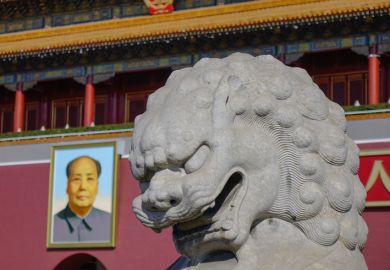Chinese students pay about three-quarters of all taught postgraduate tuition fee income at some leading UK universities, according to new estimates that are likely to heighten concern about the sector’s over-reliance on Beijing.
Calculations by the consultancy dataHE indicate that Russell Group institutions took in about £8.8 billion in tuition fee income in 2021-22 – of which £2.3 billion (26 per cent) came from Chinese students.
This was up from just £550 million (12 per cent) in 2014-15, and roughly seven times larger than India – the next biggest market in terms of tuition fee income. The share of income from China is expected to have increased further in 2022-23.
The analysis combines Higher Education Statistics Agency (Hesa) data on enrolments, excluding Scottish students, with fee averages from databases held by Times Higher Education.
At an institutional level, it found that many of the country’s top research-intensive universities had become two or even three times more dependent on Chinese students’ tuition fees over this period.
They were associated with 40 per cent of total fee income at UCL in 2021-22 – up from just 14 per cent seven years previously. Others with particularly high estimates included the University of Southampton (38 per cent) and the University of Sheffield (37 per cent).
In contrast, with just 11-12 per cent of total tuition fee income from China, the University of Oxford and the University of Cambridge are thought to be among the least dependent on Beijing.
With domestic tuition fees frozen, leading universities have increasingly turned to international students to plug holes in their finances.
Campus resource collection: Create welcoming classrooms for international students
And, despite repeated warnings from regulators and experts, amid increasing geopolitical tensions, they have continued to recruit heavily from China.
The dependence on China is especially pronounced at taught postgraduate level, where Chinese students are thought to be responsible for 52 per cent of the Russell Group’s tuition income.
The dataHE analysis suggests that the figure is as high as 79 per cent at Southampton, followed by Sheffield on 71 per cent and the University of Manchester on 67 per cent.
James Keeley, honorary associate of the Institute of Development Studies at the University of Sussex, said taking the “easy money” made the sector vulnerable in the event of a sudden further deterioration of relations, or Chinese economic collapse.
Pressure could also be put on institutions to rein in research or teaching critical of China, or risk losing students, he claimed.
Vincenzo Raimo, an independent international higher education consultant and a visiting fellow at the University of Reading, said over-reliance on a single country could affect the student experience.
“Diversity of nationality is often seen as a luxury, especially if the cost of diversity means increasing the average cost of acquisition,” he said.
“While [universities] recognise the risks of over-dependence and highlight it in risk profiles, the bigger risk is a fall in international tuition fee income this year.”
Mark Corver, dataHE’s managing director, said: “With the UK and China having differing outlooks on a range of geopolitical issues the risk of a sudden loss of this income is not zero. And longer term, as the number of highly ranked universities in China grows rapidly, the demand to study in the UK may diminish.
“But even without this there is a risk that by treating postgraduate teaching primarily as an income source what courses are offered will increasingly reflect what students paying the highest fees want to study. These choices may not be the strategic academic choices the university would otherwise take.
“With postgraduate taught income from UK students probably only a quarter of that from China alone, attention to postgraduate provision for UK students, often the first stage on a research career, may suffer. This matters as UK students are more likely to form part of the research base in 10 or 20 years’ time and an income-driven focus now may be storing up capability problems for the future. It is another example of the distortions triggered by the uneconomically low fee cap for UK undergraduates.”
A Russell Group spokesperson said international fee income was reinvested into teaching and research, helping to cover “significant and growing” deficits in funding for domestic students.
The spokesperson said its members recognised that “building a diverse international intake is important to financial resilience”, but warned that government restrictions on international students “could further threaten diversification efforts and the sector’s financial resilience”.
Register to continue
Why register?
- Registration is free and only takes a moment
- Once registered, you can read 3 articles a month
- Sign up for our newsletter
Subscribe
Or subscribe for unlimited access to:
- Unlimited access to news, views, insights & reviews
- Digital editions
- Digital access to THE’s university and college rankings analysis
Already registered or a current subscriber?








